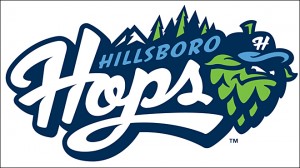 Posted by Marcus Reed
Posted by Marcus Reed
As if Oregon needed yet another reminder of the predominance of its craft beer industry, it now has a new standard-bearer in Hillsboro’s Single-A baseball team. The team’s owner announced yesterday that the Yakima Bears will now be called the Hillsboro Hops. According to the team’s general manager, the name is to recognize “Hillsboro’s proud agricultural heritage and the fact that Oregon is the second largest hop producing state in the United States.”
We can forgive the Hillsboro Hops the fact that Hillsboro itself doesn’t have much of a hop industry and that the team’s former home of Yakima is actually the largest hop-producing region in the country, because Oregon’s hop-growing industry is important to the state’s history, culture, and economy.
Hop production in Oregon began in the early 1870’s and by 1932, Oregon was the leading hop-producing state. (usahops.org) The rich soil, mild climate, and plentiful rain of the Willamette Valley are ideal for hop growth, and Oregon is largely renowned for producing the best flavor hops in the U.S. According to the USDA, Oregon hop farmers, many of whom are third, fourth, and even fifth generation hop growers, harvested 4,202 acres in 2011 for total production of 8,019,400 pounds of hops at a total production value of $23,497,000. Though production has significantly decreased since 2008, when the Belgian company InBev purchased Anheuser-Busch and largely retreated from the Willamette Valley, local hop growers are adapting and rebounding to meet the increasing demands of the craft brew market. Among recent beer trends is the use by local brewers of “fresh hops” in their early fall brews. The distinct flavor that comes from getting hops from vine to kettle within about three hours is unique to hop-growing states like Oregon.
Blake Crosby, a 5th generation Oregon hop grower at Crosby Hop Farm in Woodburn, Oregon, had this to say about the Hillsboro Hops naming:
“As part of a multi-generational hop farming family I’m continually grateful for the sacrifices made by my ancestors over the years. The hop business is challenging and, like many family businesses, most modern commercial hop farms are built on generations of hard work and passion. It’s always nice to receive recognition and like many I’m very excited about the new team. In my mind though, the credit ultimately goes to the all of the hop farmers who did this before it was cool or mainstream.”
The new team name is drawing some criticism, of course. Every online comment board on the topic is littered with negative feedback (not that I suggest reading these) about the name’s lack of ferocity. The Hops general manager, K.L. Wombacher, estimates the team is batting around .600 or .700 with the name. If you hear any of these negative comments, you might point out the importance of the hop industry to Oregon’s history and economy and the value of these hops to Oregon craft beer. You might also point out the nearby person wearing a Hillsboro Hops baseball cap. There will be a lot of us.